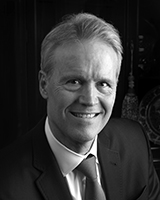
David B. Hellmann,
MD, MACP
Like many of us within our community and around the world, I watched with fascination recently as NASA’s Double Asteroid Redirection Test (DART) successfully completed its amazing mission of colliding with a small asteroid and knocking the space rock off its course. Johns Hopkins pride was in evidence for the big event, since it was the university’s Applied Physics Laboratory that led the mission on behalf of NASA.
It was quite a feat. Simply put, the DART mission showed that our best scientists now have a successful strategy to literally save the world from a catastrophic, humanity-ending asteroid collision should a large body find itself in the future with its sights on Earth.
It struck me that DART — a modest spacecraft that traveled 7 million miles over 10 months to nudge an asteroid just slightly off its course — is an apt metaphor for Johns Hopkins Medicine in general and the Center for Innovative Medicine in particular. When the Johns Hopkins University School of Medicine opened in 1893, this moderate-sized school in the moderate-sized city of Baltimore was up against an “asteroid” of medical ignorance of the day: lethal practices like bloodletting, blistering and high doses of mineral poisons. Yet Johns Hopkins managed to make a world-saving impact by nudging the world of health care into an entirely new orbit: one informed by evidence-based practice.
In a similar vein, CIM’s Miller Coulson Academy of Clinical Excellence got its start in 2008 in a single department, the Department of Medicine, on one campus, Bayview Medical Center. In the years since then, the MCACE has vastly expanded to impact departments across the Johns Hopkins Medicine enterprise. Most notably, it has pushed the entire faculty promotions process into a new orbit with a new path to promotion — a true game changer that, for the first time in the institution’s history, rewards Johns Hopkins Medicine faculty members for their excellence in clinical care.
Now, we at CIM are creating another “DART” mission to take on a dangerous crisis in health care today: a high-tech, low-touch approach to medical care that has left patients feeling dehumanized and clinicians burned out. I’m confident that with careful aim and a whole lot of creativity, CIM’s new Institute for Humanizing Medicine (which you can read more about on p. 2) will be just what our world needs to knock the asteroid of poor health care into a brand-new, healing orbit. And I invite you to join us on our mission. for the future.

David B. Hellmann, M.D., M.A.C.P.
Aliki Perroti Professorof Medicine